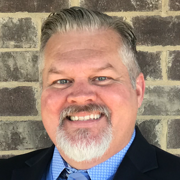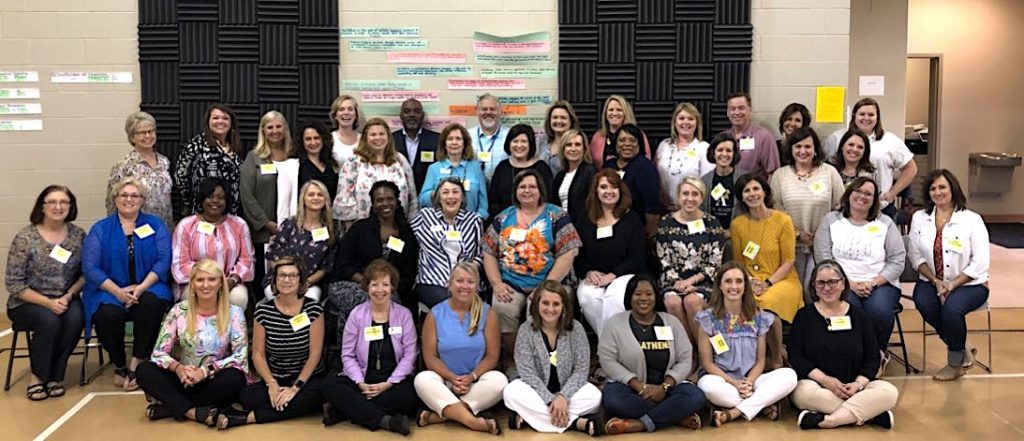 As the Alabama Best Practices Center begins its 21st year, we’ve reached another milestone. Stoney Beavers, formerly the Assistant Superintendent of Blount County Schools, joins the ABPC as our first ever Assistant Director.
As the Alabama Best Practices Center begins its 21st year, we’ve reached another milestone. Stoney Beavers, formerly the Assistant Superintendent of Blount County Schools, joins the ABPC as our first ever Assistant Director.
Our work continues to expand – we now have seven Key Leaders Networks and six Powerful Conversations Networks across Alabama. We knew it was time to bring a respected and energetic educator into the ABPC to help manage and lead these collaborations in this new decade and beyond.
 A+ President Mark Dixon and I are thrilled to have Stoney as a member of our senior leadership team! Many of you know Stoney from his participation in our professional learning programs. As you will see from my short interview with Stoney below, he brings great talent, commitment, and enthusiasm to our work. A servant leader and lifelong learner, Stoney is committed to helping A+ realize our vision of a great education for every Alabama student, regardless of where they live.
A+ President Mark Dixon and I are thrilled to have Stoney as a member of our senior leadership team! Many of you know Stoney from his participation in our professional learning programs. As you will see from my short interview with Stoney below, he brings great talent, commitment, and enthusiasm to our work. A servant leader and lifelong learner, Stoney is committed to helping A+ realize our vision of a great education for every Alabama student, regardless of where they live.
Please join me in welcoming Stoney to the A+ Education Partnership and our Alabama Best Practices Center!
Cathy Gasssenheimer: Stoney, for those who don’t know you, please tell us a little bit about yourself.
Stoney Beavers: I grew up on a small farm in Blount County, Alabama, and attended Cleveland School. After graduating from high school, I enrolled at the University of Montevallo, where I completed my undergraduate degree in Spanish and English with a secondary teaching certificate. I went on to complete my Masters in Secondary Education while teaching at Hoover High School. It had always been a dream of mine to work with the United States Peace Corps because it was, as the slogan went, “the toughest job you’ll ever love,” so I applied and received an invitation to work as a teacher trainer in Paraguay.

My time living and working in Paraguay with the Peace Corps – both training teachers and training other trainers – proved to be great experience for the work that I would do later in life. I ended up extending to be the Education Volunteer Coordinator and was later contracted to coordinate training and eventually was named the Assistant Director of Peace Corps Training.
After five years, I returned home for a visit while looking for another international job opportunity. Instead, my former biology teacher who was serving as the principal of my old high school called and said that he was looking for an English/Spanish teacher and wanted me to come in and talk to him about the position. I ended up teaching English, Spanish, and drama at Cleveland for ten years and will always cherish my time there with awesome students and colleagues. During this time, I finished my Educational Specialist Degree, became a National Board Certified Teacher, and met my wife Lisa. We started our family a few years later with the birth of our daughter Mckinley.
The 2005-2006 school year was crazy with changes. I was inducted into the Jacksonville State University Teacher Hall of Fame, was named Alabama Secondary Teacher of the Year, and received the National Milken Family Foundation Award for Educators (the Oscars of Teaching). Later, I took a position as the Secondary Curriculum Coordinator for Blount County, where I worked alongside a wonderful group of district leaders.

I worked at the district level in this position and later as the Assistant Superintendent for fourteen years. During this time, I completed a Ph.D. in Curriculum and Instruction Teaching and Learning from the University of Alabama.
Cathy: Why, at this point in your career, have you decided to leave the public school system and take on this new public school support role as the Assistant Director of the Alabama Best Practices Center?
Stoney: The opportunities that I have had in life have been direct blessings that resulted from the effort of others who supported me, coached me, and pushed me to be better. The only thing that helped me decide to leave the classroom was the hope of having an impact on even more students at a district level.
This is also my main motivation for taking on this role with the Best Practices Center – to work with others to have an even broader impact on student learning. I have seen the power of networking with other highly engaged school and classroom leaders from across the state, and I have benefited personally from the quality learning and sharing that’s really the hallmark of the work of A+ College Ready and the Alabama Best Practices Center. I will be ABPC’s first assistant director and this new position provides me with an opportunity to learn and to continue to grow with other passionate educators and educational leaders across the state who are striving every day to create great schools for every child.

Cathy: What is your vision of the work and what are some goals that you might already have as you approach this new opportunity to serve Alabama public schools?
Stoney: First, I want to continue learning alongside the many great people whom I’ve already met across other districts and in the A+ Education Partnership. I have worked and shared in learning with several of these people throughout the years. I have been involved with A+ President Mark Dixon and long-time ABPC primary consultant Jackie Walsh (we served together on the Governor’s Commission on Quality Teaching), and with you, Cathy, and so many others in the networks and institutes.
I have a firsthand knowledge of all of your work and your love for the teachers and students of Alabama. I relate very strongly to this work myself and especially the equity piece of the organization. That commitment is very important to me. My vision would be that we continue to move Alabama forward and that we find equitable ways to truly provide great schools for every child. This is the only way that we can solidify and accelerate our progress as a state, and it is very exciting – and a little daunting – to be a part of this great mission.

0 Comments on "Please Welcome Stoney Beavers, Our First ABPC Assistant Director!"